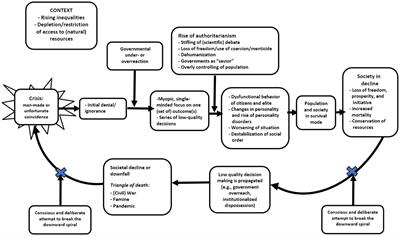Is society caught up in a Death Spiral? Modeling societal demise and its reversal

🌈 Abstract
The article discusses the concept of the "Death Spiral Effect", which describes a vicious cycle of self-reinforcing dysfunctional behavior in societies, characterized by flawed decision-making, denial, distrust, and learned helplessness. The authors aim to define and model the downward spiral of societal decline, as well as explore ways to reverse this trend. The article draws on theories from various disciplines, including complex adaptive systems theory, social safety theory, and management theories on organizational decline and turnaround.
🙋 Q&A
[01] Sociological Theory
1. What is the "Death Spiral Effect" and how is it defined? The Death Spiral Effect is defined as a vicious cycle of self-reinforcing dysfunctional behavior, characterized by continuous flawed decision making, myopic single-minded focus on one (set of) solution(s), resource loss, denial, distrust, micromanagement, dogmatic thinking and learned helplessness. It is often initiated by an external or internal event (e.g., crisis) causing a trauma or emotional response, and sets in when a cascade of events is difficult to stop once set in motion.
2. How does the Death Spiral Effect differ from other related concepts like groupthink, mass formation, and Abilene paradox? The Death Spiral Effect differs from these other concepts in that it involves a more long-lasting, pervading, and pathological form of dysfunctional behavior that affects many aspects of a person's life, a team, a company or even an entire society. It involves a repetitive cycle of flawed decision-making, unlike the more finite series of decisions around a single topic or outcome seen in groupthink, group polarization, and the Abilene paradox.
3. What are the key markers of societal decline associated with the Death Spiral Effect? Key markers include a steep increase in inequalities, government overreach, over-integration (interdependencies in networks), and a rapidly decreasing trust in institutions leading to a collapse of legitimacy. The article also discusses how rising inequalities, the dysfunctional behavior of both the elite and masses, and the rise of authoritarianism can contribute to societal decline.
4. How does the COVID-19 crisis relate to the Death Spiral Effect? The article suggests that the COVID-19 crisis may have been characterized by groupthink and escalation of commitment to one course of action (e.g., lockdowns), at the expense of other possible solutions. This led to low-quality decision-making, overreaction, and policies that exacerbated existing societal problems like inequalities.
[02] Reversing the Downward Spiral
1. What strategies are proposed to reverse the Death Spiral Effect and build an upward spiral? Key strategies include:
- Promoting open-mindedness and reflection on the current situation to develop a strategy for restoring trust, rather than finding scapegoats
- Involving more members of society in the decision-making process
- Enhancing resilience through strengthening social integration and networks
- Promoting compassion and a sense of purpose to alleviate suffering
- Employing effective turnaround leadership to break the negative spiral and restore trust
- Avoiding a blame game and instead focusing on reconciliation and learning from mistakes
2. How can decreasing inequalities help reverse the downward spiral? Decreasing inequalities is identified as a top priority, as rising inequalities are a key marker of societal decline. The article suggests an optimal level of income differences, rather than complete equality, is key. Involving the public in shaping the response to crises can help prevent further widening of disparities.
3. What role can collective action play in reversing the downward spiral? Collective action, such as non-violent civil disobedience and protests, can help challenge the status quo and power structures that perpetuate inequalities and societal decline. However, the article notes that such collective action is often seen as illegitimate and shut down by the ruling elite.